Our Commitment
For over 150 years, Sprague has led the way, evolving and innovating to meet your energy needs. Today, our commitment to progress continues through carbon offsets, low-carbon, and renewable fuel offerings. Partner with a forward-thinking, Northeast-based company that shares your sustainability goals. Sprague is dedicated to the long-term sustainability of energy usage. Sprague also works to support the use of solar on existing tank infrastructure and offers logistical support and storage for windmill components.
Recipient of the Sustainable Impact Award for Tank Top Solar
1st National Biodiesel Board Certified BQ-9000 Marketer in U.S.
Introduced Renewable Diesel to the NY Metro Area
Over 20 years of handling wind components in the Northeast
Environmental Stewardship
Our attention to the environment includes satisfying regulatory requirements and working closely with local regulatory, enforcement and public safety representatives on their plans and programs. These efforts include regional emergency response plans and drills that Sprague actively promotes.
Loss of Primary Containment (LOPC)
Sprague is committed to the protection of the environment in all areas of its operations and to careful compliance with procedures designed to mitigate impact to the environment. The company seeks to reduce the environmental impact of its activities through its long-standing commitment to compliance, safety, cleanliness, preventative maintenance, and environmental management systems. The environmental, health, and safety policies and the Sprague facility’s environmental compliance manuals and guidelines address matters such as:
- Spill prevention and recovery
- Classification and disposal of hazardous materials
- Compliance with clean air requirements
- Compliance with clean water requirements
- Product specifications
Air & Water Compliance
The sources of air emissions from Sprague Terminals primarily include storage tanks, loading racks, combustion equipment, material handling, and equipment fugitives.
Sprague has both vapor recovery and vapor combustion units at several terminals that are designed to control vapors from loading resulting in a significant reduction of air emissions.
Sprague limits internal floating roof landings whenever possible. When a roof needs to be landed or a tank cleaned, the terminal works to refloat or degas the tank as expeditiously as possible. The effort terminals make to seamlessly tie in operation with best environmental practices is ingrained in the culture.
To satisfy requirements of the Oil Pollution Act of 1990 (OPA), as it applies to Sprague’s Marine and Non-Marine Transportation-Related Facilities, Sprague developed and maintains Integrated Contingency Plans (ICPs). In addition to OPA requirements, the ICPs cover requirements for various State and Federal Regulations including the United States Coast Guard (USCG) and the Occupational Safety and Health Administration (OSHA). The ICPs cover spills and other emergencies that could occur at the Terminal. Techniques and response procedures are included for spills onto land and spills that could enter waterways, fires and other emergencies.
Reducing On-Site Energy Usage
In 2022, Sprague received a $301.5k grant from the local utility to contribute to a condensate return project at the River Road Terminal. Six Used Cooking Oil (UCO) tanks and a bio heat exchanger (which heats multiple tanks) had no way of returning condensate. The tanks and heat exchanger consumed, on average, over 10,000 gallons of water per day for make-up feedwater. By implementing the condensate return project, it is estimated that we will reduce our water consumption by 2-million gallons per year, and our natural gas consumption associated with the heat exchanger by 49,000 therms per year.
After great success in emissions reduction and fuel saving following upgrades to the burner system for our boilers at the Searsport Terminal in 2020, we are adding two new burner systems at the River Road Terminal in 2023. This represents a fuel savings of 2.6%, almost 2,200 dekatherms, $15,800 per year, and an emissions reduction of 21.5%.
Low Carbon Initiatives
Biofuels
Sprague is an industry leader in pioneering and introducing new products. Sprague is focused on increasing its renewable and lower-carbon fuel offerings and has offered them since 2000. Sprague became the first nationally recognized National Biodiesel Board Certified BQ-9000 terminal marketer in 2006.
Biodiesel is a clean-burning alternative fuel sourced from renewable feedstocks—including soybeans, corn and canola. As a leading supplier in the Northeast, Sprague helps customers from transit authorities to municipalities fuel their fleets with on-spec, clean fuel. Our fuels are rigorously tested to ensure the blend you require is the blend you receive.
Committed to Quality
Biodiesel blends significantly reduce greenhouse gas emissions and our dependence on foreign oil imports while providing natural, improved lubricity and an increased cetane rating. These blends do not require additional infrastructure or equipment modifications.
Biofuels contain no petroleum, but can be blended at any level with petroleum diesel to create a biodiesel blend based on application need - from diesel engines to home heating oil. Biodiesel can be used in its pure form as B100 and has been commonly used in on-highway diesel engines as B20 (20% biodiesel and 80% petroleum diesel). Additionally, a B2 - B5 blend has been successfully blended into #2 heating oil for home heating.
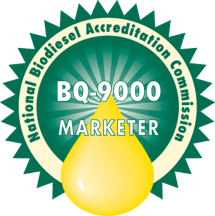
BQ-9000 Certified
Sprague is a BQ-9000 certified marketer at our Bronx, New York facility and was the first marketer in the U.S to receive the accreditation. BQ-9000 is a certification program that includes quality control procedures for fuel storage, handling and management aimed at ensuring fuel quality throughout the production and distribution network. Sprague ensures that the biodiesel meets and or exceeds American Society of Testing Materials (ASTM) specifications including ASTM-D-6751. Click here to view our BQ-9000 certification.
Renewable Fuels
Sprague has championed advancements in transportation and heating fuels to reduce environmental footprints for its customers. As a natural progression, Renewable Diesel (RD) emerges as the next step in reducing emissions and embracing renewable energy without the need for costly investments in new infrastructure. This advanced, no carbon, ultra-low sulfur drop-in fuel replacement is designed to significantly reduce emissions. Unlike biodiesel, it offers reliable cold weather performance, and is free of sulfur, oxygen and aromatic compounds.
In August 2023, Sprague began offering renewable diesel (RD) for delivery and transport rack loading at the Bronx Terminal, New York City‘s largest storage and rack loading facility.
In January of 2024, Sprague expanded its RD offerings in collaboration with Sonomax by opening NYC‘s first retail fuel station dispensing renewable diesel.

Electrification
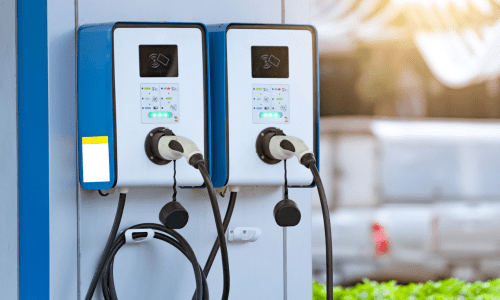
We're committed to empowering your transition to electrification with our comprehensive, flexible, and simplified solutions. From fleet management to EV charging stations and depots, we provide everything your business needs to navigate the complex EV landscape with ease and certainty.
Renewable Initiatives
Mack Point Floating Ocean Wind Terminals
The Mack Point Floating Ocean Wind Terminal stands out as a low-impact alternative to traditional energy sources. Several factors contribute to this: the project avoids environmentally sensitive areas, significantly reduces dredging needs, and utilizes a dedicated 100-acre plot with minimal land impact. Furthermore, the design mitigates the effects of strong winds and currents, minimizes disruption to wetlands, and reduces the need for soil extraction. The terminal also boasts an increased capacity for docking vessels, and represents a lower-impact reuse of an existing industrial site. Overall, the Mack Point Floating Ocean Wind Terminal offers a sustainable and environmentally friendly approach to energy generation.
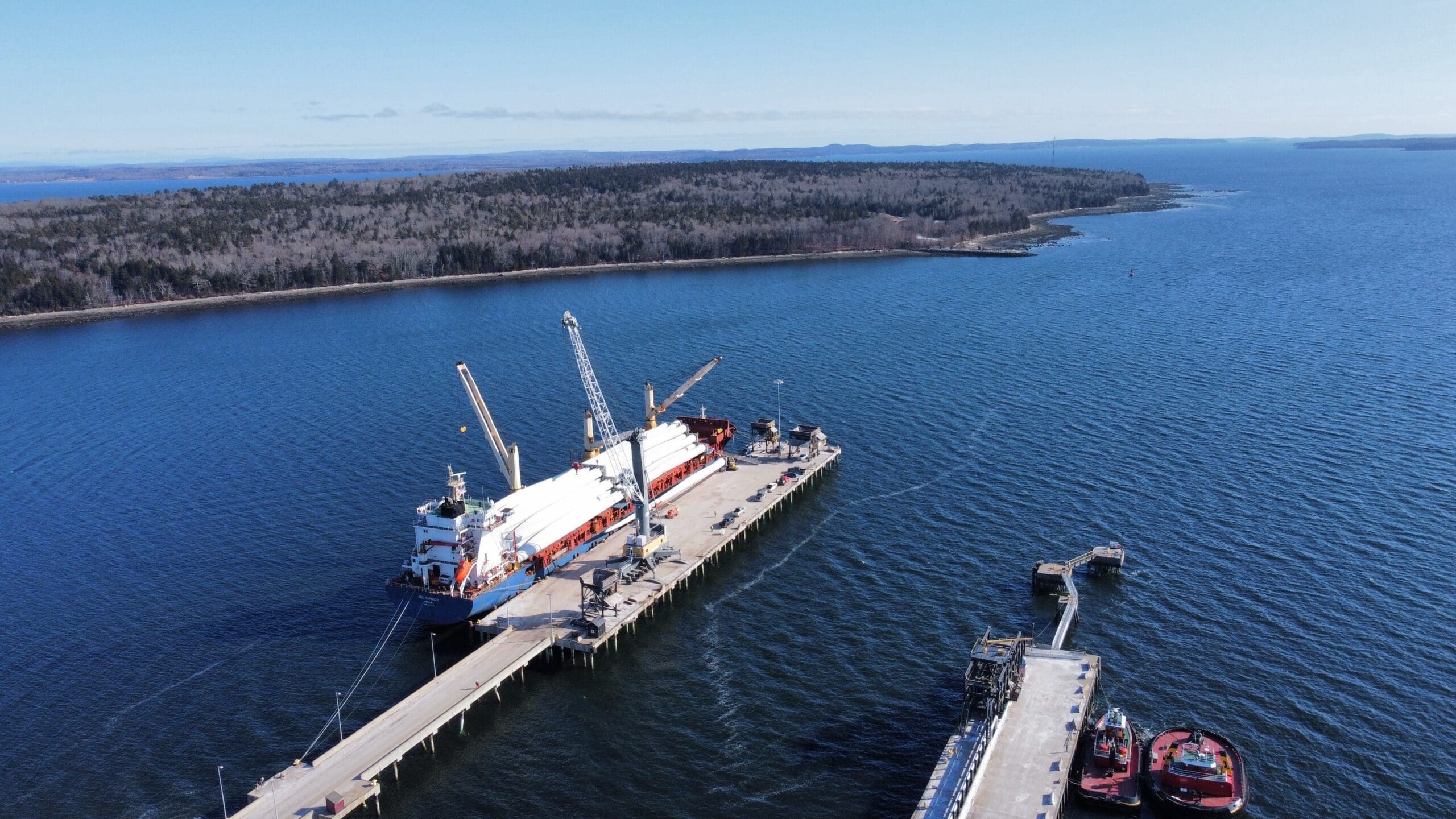
Sprague Solar

Through its energy-efficiency programs and the implementation of cutting-edge techniques to reduce emissions, Sprague is dedicated to preserving the environment for a cleaner future. The company is also introducing other industry participants to the benefits of converting storage tanks to solar tanks. Sprague is enthusiastic about the prospect of forming partnerships with these companies, enabling the solar tank initiative to benefit the industry as a whole. The company is fully equipped and ready to support businesses in their pursuit of producing renewable solar energy on top of their existing petroleum storage assets.
This renewable energy source can significantly reduce your reliance on conventional energy, lowering electricity bills and operational expenses. Energy generated by the solar panels can be used directly to power operations on-site, such as pumps or machinery. This reduces the need to draw power from the grid, helping to normalize your energy consumption and reduce strain on the grid during peak times.
NE Renewable Power
In an exciting development for Sprague, 2022 saw us join forces with Hartree. This strategic partnership included the acquisition of NE Renewable Power and its seven biomass facilities in Massachusetts, New Hampshire, and Maine. This move not only expands our presence in the renewable energy sector, but also leverages Hartree's expertise and our own in industrial operations.

Health & Safety
Sprague is committed to the health, safety and well-being of our employees and our customers. Safety is both a company and an individual responsibility—and one of our core values. Sprague provides a safe and healthy work environment for all employees through proper safeguards and essential training. We believe that superior safety performance is achieved when employees maintain a high level of motivation and willingness to succeed and have the ability and opportunity to effect safe practices.
Sprague tracks several safety metrics to monitor its performance and identify areas for improvement. One key metric that demonstrates our safety performance and our efforts in reducing illness and injuries is the Recordable Injury Frequency (RIF). RIF measures the number of work-related injuries, illnesses, or fatalities per 100 full-time employees within a year. Three of our terminals have gone 20-years without a single OSHA recordable injury.
Another imperative metric for tracking safety performance is Days Away Restricted Duty and Transfer (DART). This KPI measures serious incidents requiring time off work, job transfer, or restriction caused by workplace injuries or illnesses per 100 full-time employees within a year.
A “Good Catch” is the recognition of an event or circumstance which has the potential to cause an incident. A Good Catch may include a corrective action and/or other timely intervention to remedy the potential hazard.
The Good Catch Program was launched in 2019 as an initiative to foster a culture of safety in the workplace. The program encourages all employees and contractors to report any potential hazards, unsafe conditions, or risky behaviors they observe that could result in accidents, illnesses, damage to property, fires, spills, or other incidents. All facilities and operations are regularly inspected to identify potential hazards and risks, which include physical, chemical, thermal, and noise hazards. Once identified, controls are put in place to eliminate or reduce these risks to an acceptable level, including engineering controls, administrative controls, personal protective equipment, safe work practices, and emergency response plans.
Sprague prioritizes the safety of our employees, contractors, customers, and the communities we operate in. In our safety culture, each employee and contractor have the responsibility for maintaining a healthy and safe workplace by following health and safety rules and regulations and reporting accidents, injuries, and unsafe equipment, practices, or conditions.
Our safety program incorporates best practices from around the industry and is tailored to the unique hazards of oil storage and transportation and material handling. We have policies, procedures, and protocols in place to minimize risk, including operational controls, emergency preparedness, equipment maintenance, job hazard analysis, safety training, reporting, and auditing mechanisms. We regularly evaluate the safety and environmental performance of each facility and establish measurable HSE goals to improve performance.
Transport safety is important not only for the safety of our employees and contractors but also for the safety of the general public and the environment. As such, Sprague conducts regular maintenance and safety checks, employs qualified drivers, and ensures drivers comply with all relevant laws and regulations. All transport-related incidents are reported in our incident management system and investigated to identify trends and areas of improvement. The company also utilizes a range of safety technologies to monitor the location and movement of its transport vehicles, allowing for quick responses to emergencies and preventing accidents.
Sustainability Programs
Carbon Offsets
Aim to meet your sustainability goals without fuel system changes
Sprague’s new Carbon Offset Program allows you to easily offset your carbon fuel purchase without any system or infrastructure changes. Simply ask to add our Carbon Offset to your next fuel purchase and start offsetting your fuel for a more sustainable future.
Sustainable Fuel Made Easy:
- No fuel system modifications needed
- Sign up and we’ll add you to our list of Carbon-Neutral Fuel Customers
How it works:
- Simply ask your Sprague representative to add carbon offsets up to or equivalent to your current or next fuel purchase.
- Sprague purchases carbon offsets from certified, reliably sourced projects that help reduce greenhouse gas emissions, such as forest restoration, energy efficiencies, wind farms, and hydroelectric initiatives.
Maine Net Metering Program
An Act To Promote Solar Energy Projects and Distributed Generation Resources in Maine
Maine businesses can save on electricity costs and support solar energy with no upfront costs or system modifications. Maine Governor Janet Mills signed into law LD 1711 to Promote Solar Energy Projects and Distributed Generation Resources. The legislation encourages Community Solar Energy Projects support, and promotes the use of clean, renewable energy.
How does it work? Businesses commit to purchasing electricity derived from a solar project, and then receive solar energy credits on their monthly utility invoices.
Why does it matter? Local businesses can save on electricity costs, lock in energy rates, support sustainable energy, and do so with no upfront costs or system modifications.
Who is eligible? Businesses that use Central Maine Power or Versant Power for their electricity.
What's the timing? This state-sponsored program is live now, but availability will likely run out within a year. Many municipalities and larger organizations are already taking advantage. Other states have done similar programs successfully. We encourage you to strongly consider it before the opportunity is gone.
- Send Sprague electronic copies of your most recent electricity invoices that you want to include in the program.
- Sprague will review available projects and provide you with a savings estimate based on the number of solar credits you would like to purchase.
- Agreements will be reviewed and signed.
- Credits, savings and payments will begin when the project becomes operational, most likely in the first or second quarter of 2021.
Solar Project Developers are eligible for significant utility credits if they build small solar electricity projects and push the derived electricity to the utility grids. In order for the developers to turn the credits they earn into cash, they sell them to businesses like yours at a discounted rate.
For example, if you normally spend $100,000 a year on electricity, you could decide to commit conservatively to an annual solar credits buy of $70,000. You’d then purchase $70,000 worth of credits for the going rate, let’s say it’s 85 cents on the dollar, or $59,500. Assuming your annual electricity usage came in at the typical $100,000, you would pay for $70,000 of that annual bill of $100,000 using the credits, and the other $30,000 like usual. In this scenario, your annual savings would be $10,500, or a little over 10%, because you bought $70,000 worth of credits for only $59,500.
Although the legislation requires 20-year contracts, Sprague has negotiated early termination rights without penalties.
Each month, your utility invoice will show a solar program credit and using the example above, you would pay the solar developer 85% of the value of the credit - it's that simple.
If you purchase too many annual credits, you will not receive the full value of the credit and may be liable to a project developer for a higher contracted rate. You should purchase only 70 - 90% of your historic spend to provide protection in the event you use less power for any reason.
Serving Communities
Charitable Contributions
Sprague strives to be a good corporate citizen with a strong focus on the markets where we operate. As an industry leader, we recognize the importance in giving back to the communities where we live and work.
Sprague dedicates significant resources to improving communities—both as a company and through our employees. Our annual charitable contribution program donates to dozens of local organization across our footprint. Apply here to be considered for funding. We prioritize organizations and projects benefiting children and the environment.
- Sprague is a significant donor to the Muscular Dystrophy Association. For more than 30 years, Sprague has hosted an annual customer appreciation charity golf event, surpassing the $1,000,000 mark in 2013, a year when it raised over $100,000 for this organization, which works with children and adults affected by neuromuscular diseases.
- With both financial and personal resources, Sprague supports the Big Brothers and Big Sisters of the Greater Seacoast organization, which pairs at-risk youth with adults interested in helping them realize their potential and build their futures.
- Sprague employees participate in the annual Penguin Plunge for Special Olympics, typically held on a (very) cold January day. The Sprague group, affectionately named “Buck’s Ducks,” plunges into the Atlantic Ocean to raise funds for the Special Olympics of New Hampshire.
- Additionally, Sprague Employees volunteer thousands of hours, working with dozens of nonprofit organizations across the Northeast. The company actively supports our employees’ volunteerism. One example is our regular support of the United Way Day of Caring, during which dozens of employees participate in community service activities.
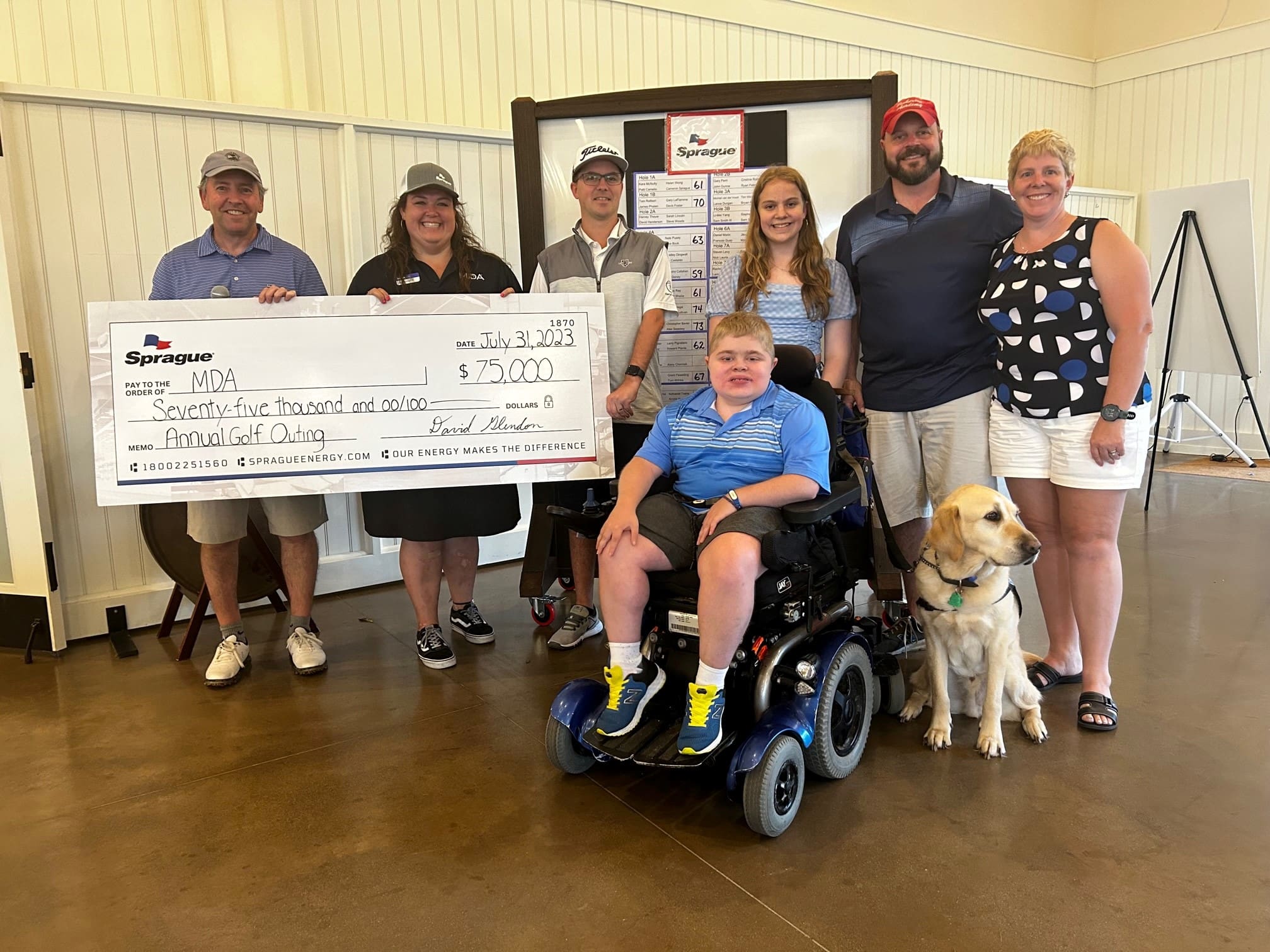
Driver Appreciation Days
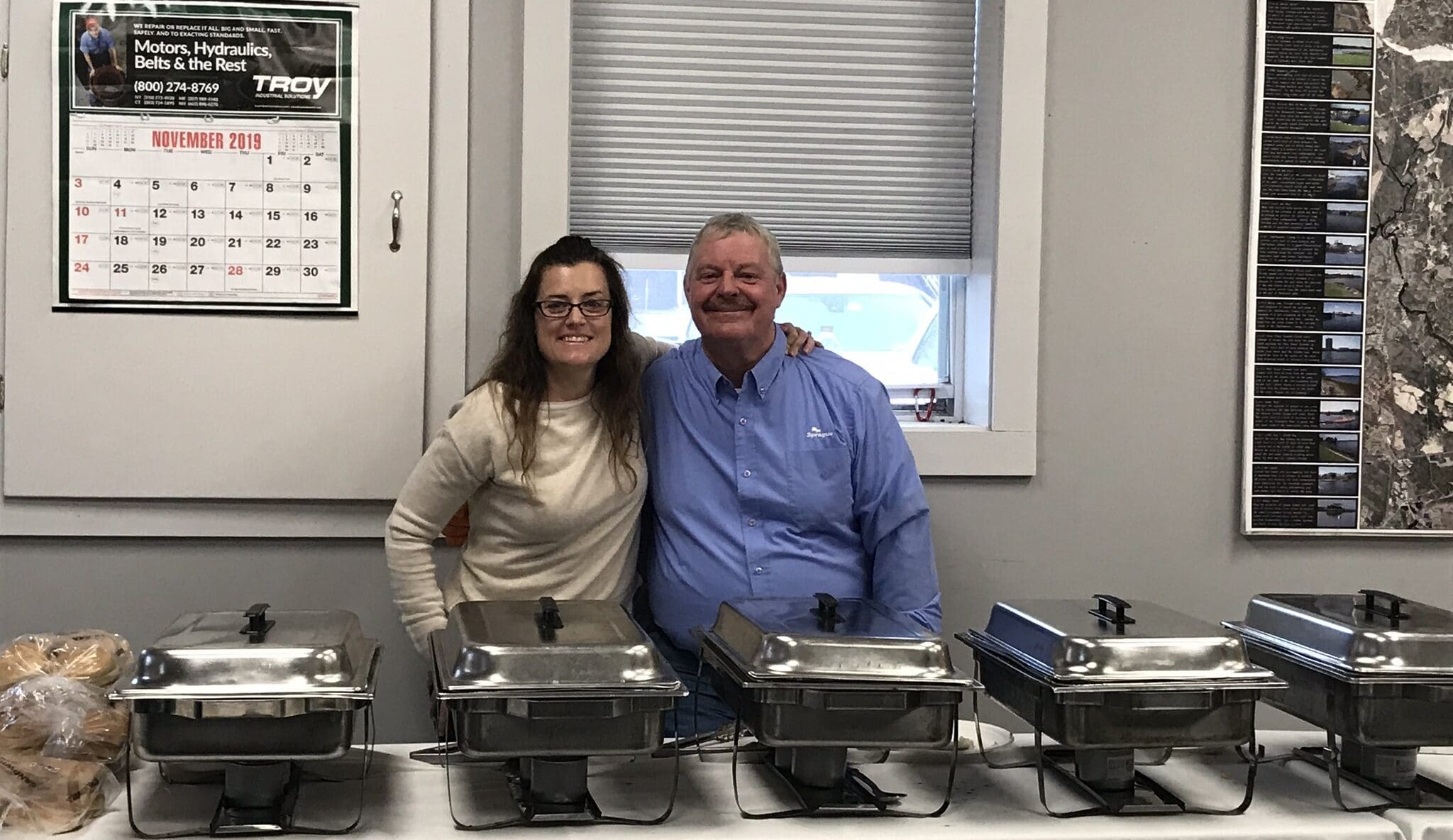
Celebrating the 'Driver Appreciation' initiative at Sprague, this program is dedicated to expressing our gratitude to drivers who play a crucial role in our operations. The initiative includes the distribution of swag, food, and other tokens of appreciation to acknowledge their hard work and commitment.
Sprague's 'Driver Appreciation' program highlights our recognition of drivers' vital role in our success. We aim to foster a sense of community and appreciation through gestures of gratitude like swag and food, reflecting our respect and thanks for their indispensable contributions.
Your Partner in Energy
At Sprague, we understand the importance of finding energy strategies and services that fit your needs. Our account managers are experienced and local, offering deep insights and industry knowledge. Contact us today to see how we can make a difference for your business.
Please note: At this time, Sprague serves businesses only.






